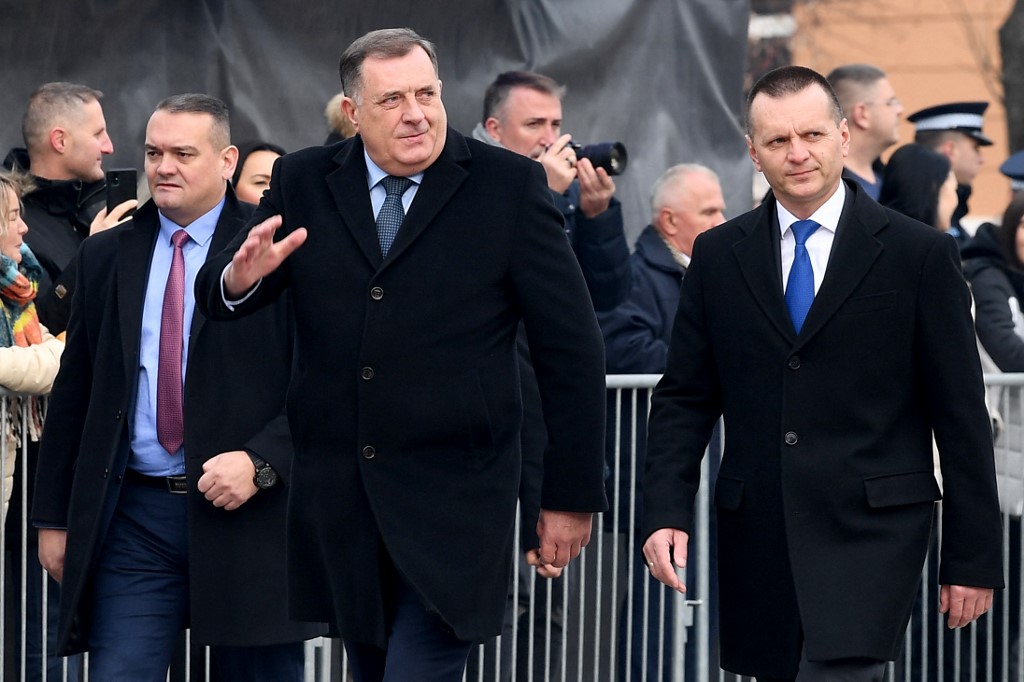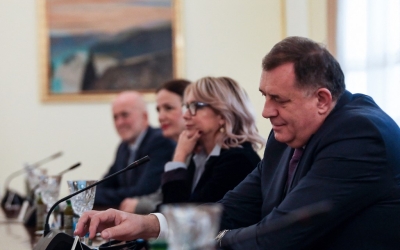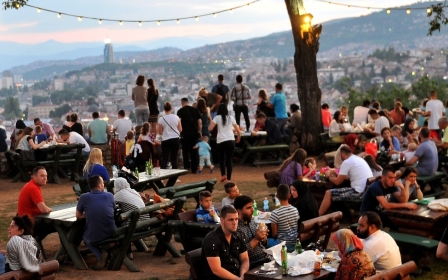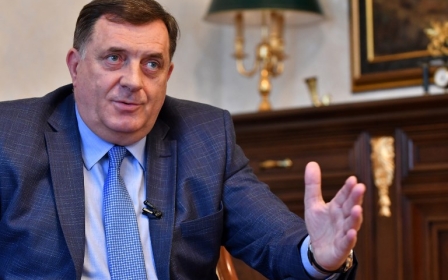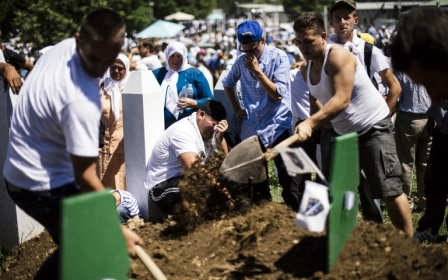Bosnia crisis: Why Muslims could once again end up in mass graves
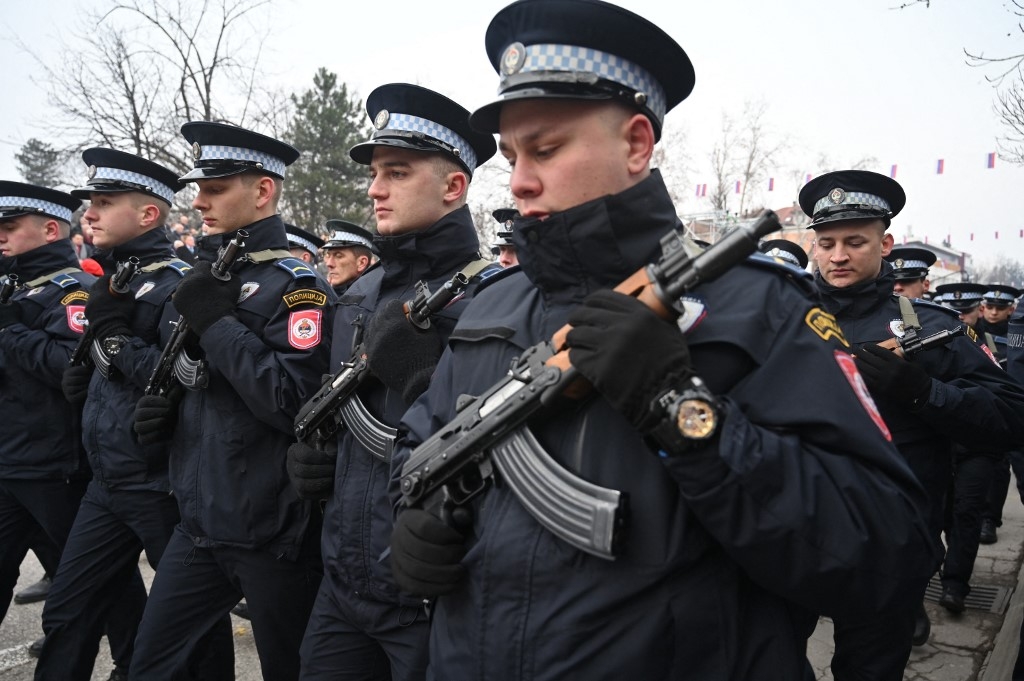
This month marked 30 years since the founding of Republika Srpska, when Bosnian Serbs declared their own state in Bosnia and Herzegovina, followed by ethnic cleansing and genocide. Commemorating its founding on 9 January 1992 was declared unconstitutional by Bosnia’s Constitutional Court in 2015.
During celebrations across Republika Srpska, where genocidal violence against non-Serbs was committed during 1992 and 1995, war criminals were reportedly glorified, while returnees to towns from which non-Serbs were expelled were targeted. The celebrations included a march by armed police through Banja Luka.
The feeling that peace is only temporary has never completely left me
In the summer of 1992, as the mass killings and disappearances of Bosniak Muslims in my hometown of Visegrad intensified, my mother and I separated from my father, my 17-year-old brother and my 13-year-old sister, who were among the groups targeted first. I was six years old at the time. They fled Visegrad, while my mother and I went to her parents’ village; she could not leave her parents behind. It was a time of deep fear and despair.
We soon realised, however, that we also needed to flee. My grandfather hid the family’s valuables in hopes of reclaiming them upon our return. But we never returned, and I never saw my grandfather again.
In July 1995, the genocide culminated in the Srebrenica massacre. My grandfather, and many others from his village, were among more than 8,000 men and boys killed. His partial remains were recovered from a mass grave near Zvornik in 2009; then, in 2020, one of his missing arm bones was exhumed from another mass grave.
Atrocities and denial
The feeling that peace is only temporary has never completely left me. Although some of the worst atrocities were committed in my hometown - mass rape, torture and murder, including the burning to death of more than 120 civilians, mostly women and children, in June 1992 - Visegrad’s Serb residents and government officials continue to deny these crimes ever took place there.
These crimes are both systematically denied, yet celebrated. Some of the perpetrators still serve in the government and police force. In March 2019, members of the Ravna Gora Movement, a Serb nationalist Chetnik organisation, rallied in Visegrad and chanted: “There will be hell, the Drina [river] will be bloody, here come the Chetniks from the Serb mountains” - an apparent call to ethnic cleansing and genocide.
The political crisis in Bosnia and Herzegovina in recent months, described in a report delivered to the UN last year as the biggest “existential threat of the post-war period”, reawakened my trauma of the war, driving home the threat that it could soon start all over again. I felt as helpless as I did three decades ago when I separated from my family members, some of whom I never saw again.
The political crisis escalated when the Office of the High Representative, which oversees the implementation of the peace agreement that ended the Bosnian war, announced last July the criminalisation of genocide denial in Bosnia and Herzegovina. Milorad Dodik, the Serb member of Bosnia’s tripartite presidency, subsequently rejected the announcement, saying the law would never be accepted and Republika Srpska would “launch the process of dissolution”.
In December, the National Assembly of Republika Srpska moved to withdraw from Bosnia and Herzegovina’s judiciary, security and defence institutions. Dodik has also threatened to expel Bosnian army troops from Republika Srpska. In a report to the UN, Bosnia’s high representative warned Dodik’s actions were “tantamount to secession without proclaiming it” - and if the international community does not intervene quickly, “the prospects for further division and conflict are very real”.
Anti-Muslim rhetoric
Dodik has said that if the West tries to intervene militarily, he has “friends” who would support the Serb cause. The 9 January ceremonies in Republika Srpska were attended by top Serbian officials, the Russian ambassador, the Chinese deputy ambassador and far-right European politicians.
According to a recent report by the Balkan Investigative Reporting Network, Russian government-backed foundations have been holding events to promote reports denying the 1995 Srebrenica genocide, “as Moscow seeks to exploit divisions in Bosnia and Herzegovina and increase its influence among the country’s Serbs”.
Meanwhile, Hungarian Prime Minister Viktor Orban, known for his anti-immigrant policies and his claims that Muslims pose a threat to Europe’s Christian values, strongly supports Dodik. He has vowed that Hungary would block any EU move to sanction Dodik for his separatist plans, and the Hungarian government has provided 100 million euros ($114m) in financial assistance to Republika Srpska to “enhance stability in the region”.
At a summit in Budapest last September, Dodik said: “We are Christians. This is my experience, and my experience makes me say that the Muslims do not abandon their values … I just call us to defend Europe, the whole of Europe, not just the European Union.”
The same kind of anti-Muslim rhetoric was used by Serb nationalists in the 1980s and 1990s, aiming to justify their genocidal campaigns against Bosniak Muslims. In 1994, former Bosnian Serb leader Radovan Karadzic said Muslims “have dark schemes, wishing to make Bosnia a springboard for Islamic penetration in Europe”. He added that the West would “be grateful to us one day because we decided to defend Christian values and culture”.
Dodik’s actions and open separatist threats present a test for the international community. Will the world react, or will it again stand by and allow another genocide? The notion of a “Serb-only” army brings me back to 1992, when Bosniaks were disarmed and trapped at the mercy of Serb forces, who were acting on orders to ethnically cleanse the region. If Dodik’s proposal comes to fruition, Bosniak Muslims could once again end up in mass graves.
The views expressed in this article belong to the author and do not necessarily reflect the editorial policy of Middle East Eye.
Middle East Eye propose une couverture et une analyse indépendantes et incomparables du Moyen-Orient, de l’Afrique du Nord et d’autres régions du monde. Pour en savoir plus sur la reprise de ce contenu et les frais qui s’appliquent, veuillez remplir ce formulaire [en anglais]. Pour en savoir plus sur MEE, cliquez ici [en anglais].



